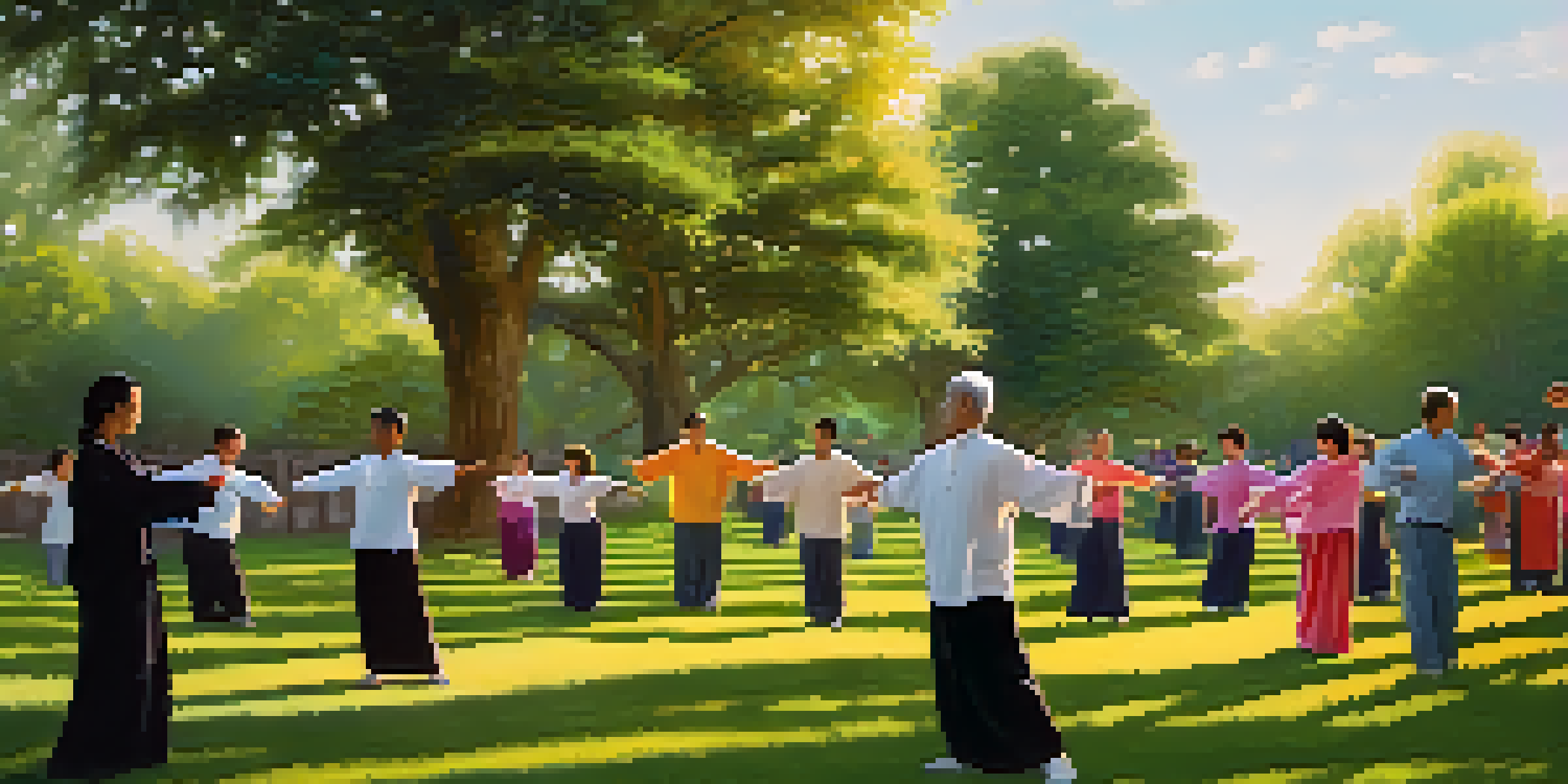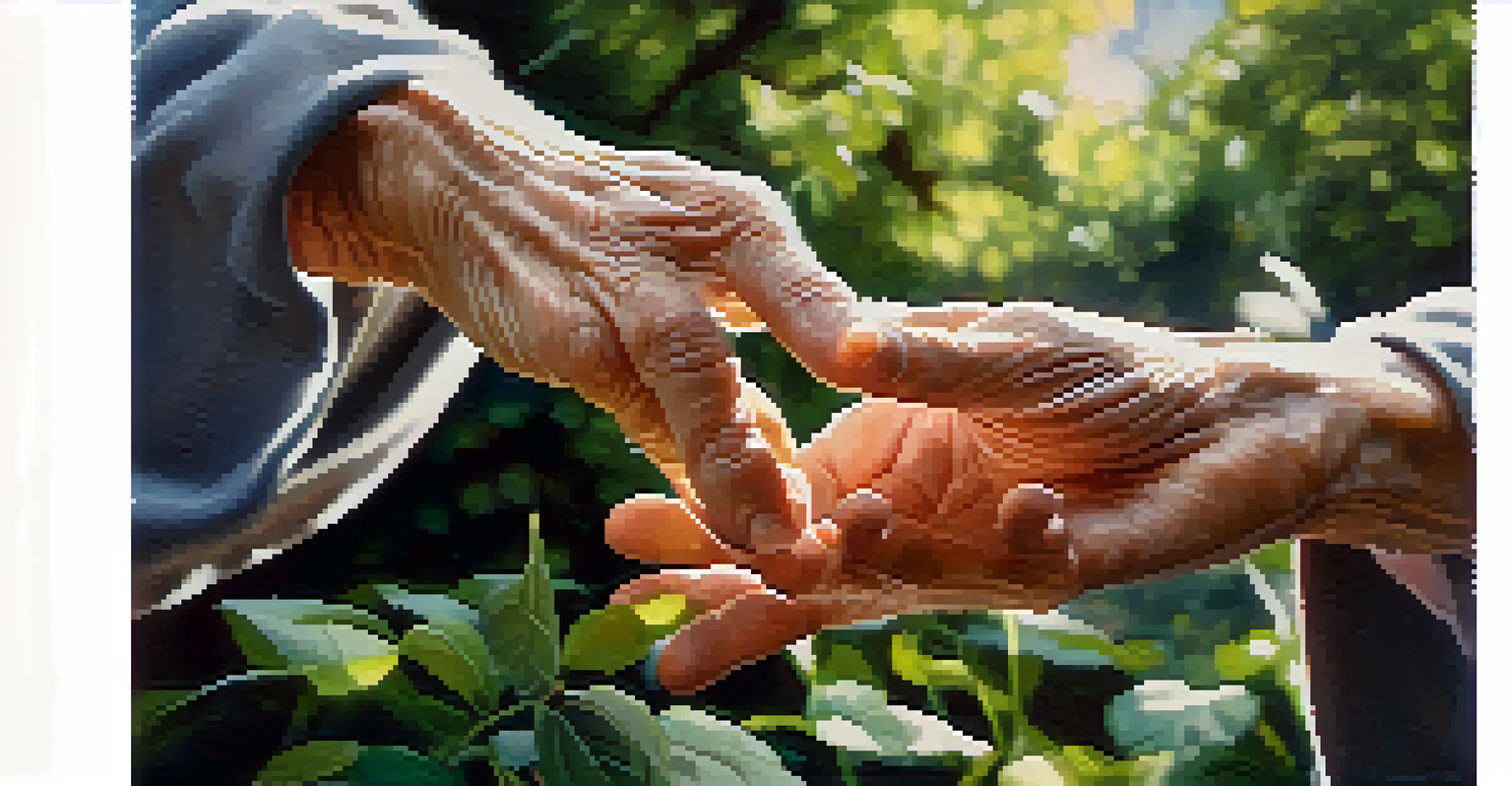Exploring Tai Chi: Movement Therapy for All Ages

What is Tai Chi? A Gentle Introduction to the Art
Tai Chi, often described as 'meditation in motion,' is an ancient Chinese practice combining slow, deliberate movements with deep breathing. This low-impact exercise is accessible to people of all ages and fitness levels, making it a wonderful choice for anyone looking to improve their physical and mental well-being. At its core, Tai Chi emphasizes balance, flexibility, and mindfulness, allowing practitioners to connect deeply with their bodies and surroundings.
Tai Chi is a way of nurturing the spirit and cultivating a state of peace and harmony.
Imagine Tai Chi as a flowing dance; each movement transitions smoothly into the next, creating a sense of harmony and tranquility. This unique approach to exercise encourages relaxation and focus, which can be particularly beneficial in our fast-paced, stress-filled lives. With its roots in martial arts, Tai Chi also teaches essential self-defense techniques, but the primary focus is on health and wellness.
Many people begin practicing Tai Chi seeking relief from stress or physical ailments, only to discover a profound sense of peace and balance that permeates their daily lives. It’s not just about the movements; it’s about fostering a deeper connection with oneself and the world around us. Through this gentle practice, individuals can cultivate resilience and adaptability, much like a tree bending in the wind.
Health Benefits: Boosting Mind and Body Through Movement
Tai Chi is often praised for its myriad health benefits, from improving balance and flexibility to reducing stress and anxiety. Research has shown that regular practice can lower blood pressure, enhance cardiovascular health, and even boost the immune system. It offers a holistic approach to health, addressing both physical and mental aspects of well-being.

Consider Tai Chi as a gentle way to exercise without the strain of high-impact workouts. Its slow, flowing movements allow participants to build strength and coordination gradually, which is especially important for older adults. By focusing on controlled movements, practitioners can improve their posture and reduce the risk of falls, making Tai Chi an ideal choice for maintaining independence as we age.
Tai Chi: A Path to Wellness
Tai Chi combines gentle movements with mindfulness, promoting both physical health and mental well-being.
Moreover, the meditative aspect of Tai Chi can significantly improve mental clarity and emotional resilience. Participants often report feeling more centered and calm after a session, which can help counteract the effects of daily stressors. This blend of physical and mental health benefits makes Tai Chi a unique form of movement therapy that truly caters to all ages.
Getting Started: Tips for Beginners to Embrace Tai Chi
If you're intrigued by the idea of trying Tai Chi, the good news is that you don’t need any special equipment or prior experience to get started! Many communities offer local classes, and there are plenty of online resources available for those who prefer to practice at home. Consider joining a beginner's class where you can learn from an experienced instructor who can guide you through the foundational movements.
The mind is everything. What you think you become.
When beginning your Tai Chi journey, remember to start slowly and listen to your body. It’s essential to find a comfortable pace that allows you to enjoy the process without feeling overwhelmed. Practicing in a quiet, serene environment can also enhance your experience, helping you focus on your movements and breath.
As you progress, you might find that your confidence and ability to execute the movements improve. Don’t be discouraged if it feels challenging at first; like any new skill, Tai Chi takes time to master. Celebrate your progress, no matter how small, and enjoy the journey of self-discovery through movement.
Tai Chi for All Ages: A Family-Friendly Activity
One of the most appealing aspects of Tai Chi is its inclusivity; it truly can be practiced by people of all ages. Families can enjoy this calming activity together, fostering a sense of connection while promoting health and well-being. Picture a weekend morning where grandparents, parents, and children come together in a park, moving gracefully through Tai Chi forms—what a beautiful way to bond!
Children can benefit from Tai Chi as it teaches focus, discipline, and body awareness, skills that are essential for their overall development. For older adults, Tai Chi provides a safe way to stay active, improving mobility and reducing the risk of injuries. This intergenerational practice creates a supportive environment where everyone can thrive.
Inclusive for All Ages
Tai Chi can be practiced by individuals of all ages, fostering family connections and teaching valuable life skills.
Moreover, Tai Chi's emphasis on mindfulness can help individuals of all ages manage stress and anxiety. By encouraging a calm, focused state of mind, practitioners learn to navigate life's challenges with greater ease. This shared experience can deepen family relationships and create lasting memories, making Tai Chi a wonderful addition to family activities.
The Role of Mindfulness in Tai Chi Practice
Mindfulness is a central component of Tai Chi, allowing practitioners to cultivate a heightened awareness of their bodies and surroundings. Each movement is performed with intention, encouraging participants to focus on their breath and the sensations they experience. This practice of being present can lead to greater emotional balance and a deeper connection with oneself.
Think of mindfulness in Tai Chi as a way to slow down and appreciate the moment. In our busy lives, we often rush through activities without truly engaging with them. Tai Chi encourages us to embrace the now, promoting a sense of peace that extends beyond the practice itself and into daily life.
As practitioners develop mindfulness through Tai Chi, they may find that challenges outside the practice become easier to handle. The ability to remain calm and centered in the face of stress is a valuable life skill. In this way, Tai Chi serves not only as a form of exercise but as a tool for enhancing overall well-being.
Community and Connection: The Social Aspect of Tai Chi
Practicing Tai Chi often takes place in a group setting, fostering a sense of community and connection among participants. Joining a class or group can enhance motivation and provide an opportunity to meet new people who share similar interests. The supportive environment encourages individuals to learn from one another and celebrate each other’s progress.
Consider the camaraderie found in a Tai Chi class; participants often share tips, experiences, and laughter as they practice together. This sense of belonging can be especially beneficial for those who may feel isolated or lonely. The connections formed in these settings can lead to lasting friendships that extend beyond the practice.
Mindfulness Enhances Practice
The focus on mindfulness in Tai Chi helps practitioners cultivate emotional balance and a deeper awareness of their surroundings.
Moreover, community Tai Chi events or workshops can introduce practitioners to new forms of the practice, expanding their horizons and deepening their appreciation for this ancient art. Engaging with others in Tai Chi can not only enhance your skills but also enrich your overall experience, making the journey all the more fulfilling.
Conclusion: Embracing the Journey of Tai Chi
As we explore the multifaceted world of Tai Chi, it's clear that this practice offers something for everyone—regardless of age or fitness level. From its health benefits to its capacity for fostering mindfulness and community, Tai Chi is more than just a form of exercise; it’s a holistic journey toward well-being. Whether you’re looking to improve your physical health, reduce stress, or connect with others, Tai Chi has the potential to enrich your life.
Starting your Tai Chi journey doesn’t have to be daunting; simply take that first step and embrace the experience. As with any new endeavor, patience and practice are key. Remember, the goal isn’t to achieve perfection but to enjoy the process and discover the joy of movement.

So why not give Tai Chi a try? Whether you join a class, practice with family, or explore online resources, you may find that this ancient art provides a refreshing and fulfilling approach to health and wellness. Embrace the journey, and let the gentle flow of Tai Chi inspire you to live your best life.